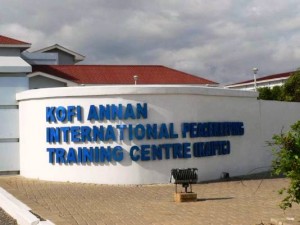KAIPTC underscores need for collective regional responses to tackle terrorism
 Air Vice Marshall (AVM) Griffiths S. Evans, Commandant, Kofi Annan International Peacekeeping Training Centre (KAIPTC) has underscored the need for collective regional responses to tackle terrorism.
Air Vice Marshall (AVM) Griffiths S. Evans, Commandant, Kofi Annan International Peacekeeping Training Centre (KAIPTC) has underscored the need for collective regional responses to tackle terrorism.
He said the growth and multiplicity of terrorist groups, their increasing level of attacks and the inability of States to respond appropriately was of primary concern to all actors in peace and security.
He noted that the ease with which these terrorist groups moved and operated across borders of nations, further underscored the transitional nature of the threat, and the need for collective regional responses.
He pointed out that the recent terrorist activities in Mali, Burkina Faso, Somalia, Libya, Northern Nigeria and Cameroon highlighted the fact that countering terrorism and asymmetric warfare in Africa required highly trained technical expertise and capacity building.
AVM Evans made the call in his welcome address at the opening ceremony of the ‘Counter Terrorism course’, in Accra.
It was organised by the KAIPTC and funded by Economic Community of West African States (ECOWAS) Commission.
The two- week course, which is being attended by 25 participants from ECOWAS Member States aims at developing the expertise and capacity of all relevant agency personnel in law enforcement and civil society within the region to enhance their operational readiness to respond effectively to terrorism.
Topics for discussion include Concepts and Theories in Terrorism, International Legal and Human Rights Frameworks on Terrorism, Transnational Organised Crimes, National and stakeholders’ Responses to Terrorism in Africa.
The rest are the Role of Media in Counter Terrorism, and Information Management in Countering Terrorism.
AVM Evans noted that expertise was largely inadequate or deficient and therefore, required efforts to bridge the capacity gap to improve the readiness of states to respond effectively.
He said on its part, KAIPTC, as an ECOWAS Training Centre of Excellence, was committed to building the capacity of citizens from within West Africa and beyond, by providing them with training that would equip them with the necessary knowledge and skills to counter terrorism.
He said the Centre had sought to bring to bear on this course its innovative approach to training and research by assembling an array of academicians, advocates and researchers of international repute in the thematic areas from across the continent.
The Commandant of KAIPTC, who acknowledged the ECOWAS Commission for their unwavering support to the Centre; also expressed gratitude to all facilitators and resource persons for their continued support and resourcefulness in strengthening the Centre’s training delivery process.
Mr Danjuma Aku, Civilian Rostering and Training Officer at ECOWAS, noted that the course signified a major milestone for the region as they sought to enhance the capacity of the Law Enforcement Agencies to counter-terrorism.
He said the course provided participants the opportunity to enhance their skills that would positively impact in their duties.
“We have decided to mix Military, Police and Civilians because we believe that the fight against terrorism must include both the hard and soft approaches to counter terrorism,” he added.
Mr Aku noted that ECOWAS, takes issues of force generation and force preparations very seriously; hence the decision to approach the European Union through the 10th European Development Fund (EDF) to support ECOWAS in conduct of this Course.
He said he was therefore hopeful that participants would make the best use of the opportunity to take home some lessons in the design of approaches to counter terrorism in their respective countries.
Source: GNA
